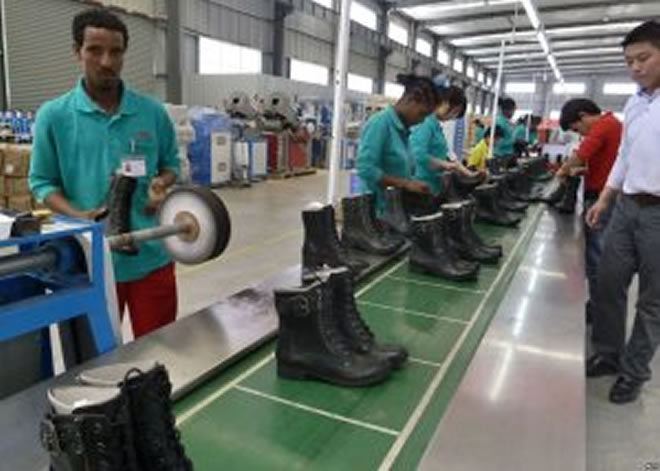
Huajian’s factory in Addis Ababa

Wednesday, September 24, 2014
HELEN Hai, GM for overseas investment at Huajian Group, a leading Chinese footwear manufacturer, has a bold vision: in 10 years she wants Ethiopia to be a global hub for the shoe industry, supplying the African, European and American markets and providing jobs for more than 100,000 Ethiopians.
“We are not coming all the way here just to reduce by 10%-20% our costs.… Our aim here is in 10 years’ time to have a new cluster of shoes making,” Hai explains. “Definitely we want to build a whole supply chain … I want everything to be produced here.”
Last January, Huajian signed a memorandum of understanding with the China-Africa Development Fund, a private equity fund that facilitates Chinese investment on the continent, to jointly invest $2bn over a decade in creating a light-manufacturing special economic zone in Ethiopia.
The company has already leased 300ha of land in Lebu, on the outskirts of the Ethiopian capital, where it plans to build a shoe city, with accommodation for 200,000 people and factory space for other manufacturers of footwear, handbags, accessories and components. Ms Hai expects construction to begin there later this year.
Huajian has a modest outfit in Dukem, about 40km south of Addis Ababa. It employs 1,600 Ethiopians, all high school graduates or above, and ships more than $1m worth of shoes each month to the US and the UK for Guess, Naturaliser and Clarkes.
Ms Hai has just rented the neighbouring compound and expects to start production there in May. Her aim is to double exports by the end of this year and quadruple them next year. That is impressive for a business that only started trading in January last year but a very far cry from the mega-factory Huajian envisions.
However, the company is not averse to a challenge. The Dukem factory became operational just three months after a meeting in September 2011 with the late Ethiopian prime minister Meles Zenawi, at which he told Huajian of his personal wish to have a functioning Chinese factory in Addis Ababa by the time the new Chinese-built and financed conference centre was inaugurated as African Union headquarters last January.
At that private meeting, Mr. Meles Zenawi outlined Ethiopia’s growth and transformation plan, a strategic framework for economic development covering the period 2010 to 2015, and explained that he wanted companies like Huajian to establish a base in Ethiopia to create jobs and increase exports. “The moment after our meeting with the late prime minister, we made a decision to make our investment.”
So why did Huajian move so quickly? “I think there are several factors,” Ms Hai explains. “Number one, during our visit to Ethiopia, we realised this country has a lot of supply of leather and that labour costs are very competitive. At the same time the electricity cost is also competitive.
“China is moving up the industrial ladder,” she continues. “For these labour-intensive industries we are thinking about what to do next. To start to go abroad, finding new territories outside China, is part of our strategy.”
Ms Hai also saw similarities between the Chinese and Ethiopian governments that she believes resulted in China’s impressive growth — good policies and a strong administration that could actually implement those policies. “Meles Zenawi, the late prime minister, gave us good confidence.”
Ms. Hai admits the company had not considered the challenges it would face in Ethiopia: “At the moment we made the decision, frankly we were not aware of all the difficulties.” She puts this down to the difference in approach between Chinese and European entrepreneurs. “A lot of European entrepreneurs, if they see a tiger they will study the tiger very well, thinking about how to conquer it,” she says. “The Chinese entrepreneur, we jump on top of the tiger and then we figure out what the solutions are.… It’s a very different mentality.”
However, Huajian has faced considerable obstacles over the past 15 months. The cost of transportation to and from landlocked Ethiopia is just one of the problems. For every 12 containers shipped, eight containers are imported at a cost of $8,000 each, which adds an additional 6% to freight expenditure compared to Huajian’s Chinese operations. Of this, $4000 goes on transport from China to the port of Djibouti; the rest is swallowed up on the 700km journey to Addis Ababa.
The efficiency of the local labour force has also proved problematic. “We’re not producing for the African market, we are producing for the international market,” says Ms Hai. “If this country wants to grow their exports, the shoes they make have to be perfect in order to meet the international competition.” To do this takes discipline — “semi-military” discipline — and the imposition of “the industrial mindset”.
China sacrificed a generation of workers during the industrialisation process — they left their homes and families in rural areas to come to work in towns and cities like Dongguan, where Huajian’s factories are based. She believes Ethiopia will have to do the same if it wants rapid economic growth.
Ms Hai does not want to be running the Addis factory in eight years’ time, she wants to hand over to an Ethiopian executive. Huajian has selected 130 university graduates from southern Ethiopia to spend a year in China at the company’s training facility in Dongguan — 270 more will be recruited from the country’s other regions. “They are going to be the future managers.… After one year’s training they will understand how to become a manager and they are going to be a new force,” says Ms Hai.
A brave new industrialised future awaits those who are prepared to submit to mass production Huajian style.
By: Elissa Jobson